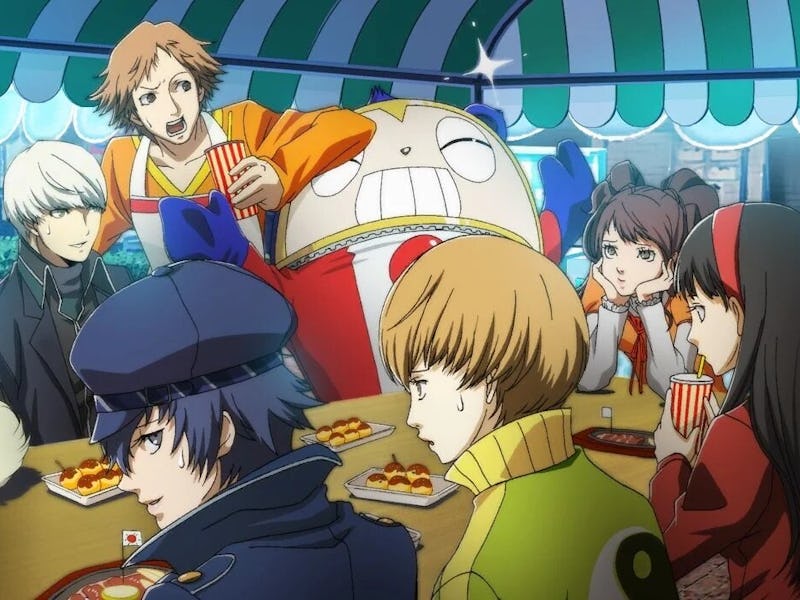15 Years Ago, Japan’s Most Underrated RPG Series FInally Went Mainstream
Every day's great at your Junes.

Persona wasn’t always the wildly successful RPG series we know and love today. Prior to 2008, it was a bit of a niche series, with several installments released across various PlayStation platforms. But all of that changed on July 10, 2008, with the Japanese release of Persona 4 on PS2. This was a revolutionary game that blended turn-based mechanics with social sim elements, culminating in one of the greatest RPGs ever made. Not only that, but it’s partially responsible for catapulting the Persona series into the mainstream, eventually leading to the now-adored Persona 5 and all of its spin-offs. But without the release of Persona 4, which celebrates its 15th anniversary this year, that simply wouldn’t have happened.
Persona 4’s visual style is striking.
Persona 4 is immediately enticing thanks to its presentation. Its welcoming anime art style does a great job of roping players in, but then, things quickly get out of hand in terms of subject matter. Persona 4 is a murder mystery, and at times, it gets quite gruesome, but its visual style softens the blow, making it appealing, despite the ominous themes. This game isn’t afraid to get serious and dark, but also upbeat and silly, sending players on a rollercoaster of a ride.
One moment, a character gets kidnapped, and it’s your job to find out what happened. The next, you’ll be gathered with your friends at the Junes Department store, eating, laughing, and having a good time. The music does an excellent job here, as well, matching the tone of whatever the game is trying to convey at the time (queue the lovely track “Your Affection,” if you want to smile). By the end of the game, you truly feel like you embarked on a meaningful journey, with a heartbreaking, yet uplifting story that will resonate with you years later.
Spending time with friends is a staple of the Persona series.
This is thanks, in part, to Persona 4’s social sim aspects, which allow you to spend time with the game’s characters. Each calendar day, you have a limited amount of things you can do, including the ability to hang out with friends in a variety of ways — like going out to a restaurant, going shopping, or simply spending time having a conversation. After 100+ hours with Persona 4, many of the characters feel like family. You really get to know them, and they all have little quirks and distinct traits.
Not only does spending time with them enrich the relationship (and story), but it also impacts specific Personas, which are creatures used for battle within the game’s dungeons.
Take your Personas to the dungeons to battle your foes.
Persona 4 isn’t only about hanging with your friends. The game is packed with labyrinthian dungeons that contain a slew of enemies (AKA Shadows). The turn-based battles feel a lot like Pokémon, wherein you must use your Personas and their various moves to take on your foes. Nearly everything you do outside of the dungeons can impact your Personas, such as their moveset, strength, and the kind of creatures you can create.
The Personas themselves are loosely based on tarot cards, with each falling into categories such as Fool, Magician, Death, Moon, and a slew of others. This adds a distinct flavor to each of the Personas you create.
Also like Pokémon, Persona 4 has somewhat of a rock-paper-scissors system, in which most creatures have strengths and weaknesses. For instance, the Succubus Persona has an affinity to Darkness and is therefore weak to Light. Because of this, you’re heavily rewarded for having a wide variety of Personas in your arsenal.
Persona 4 isn’t the first of its kind, but it’s certainly the game that made this series famous. Its PS2 release was successful in 2008, but it also got a second wind in 2012 with the release of Persona 4 Golden on PS Vita (arguably the handheld’s best game).
Today, there’s plenty of Persona to enjoy across various genres, from the fighting game Persona 4 Arena, to music-rhythm games Persona 3: Dancing in Moonlight, Persona 4: Dancing All Night, and Persona 5: Dancing in Starlight, along with the mainline Persona 5, and its spinoff Strikers, and even the upcoming Persona 5: Tactica. It’s true, there’s a treasure trove of Persona games to dive into, but without Persona 4, that likely wouldn’t be the case.
Persona 4 is available on PS2, PS Vita, PS4, Xbox One, Xbox Series X|S, Nintendo Switch, and PC.